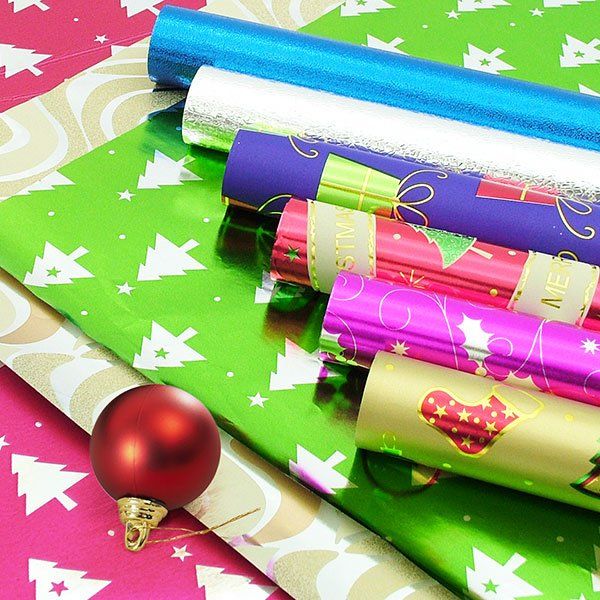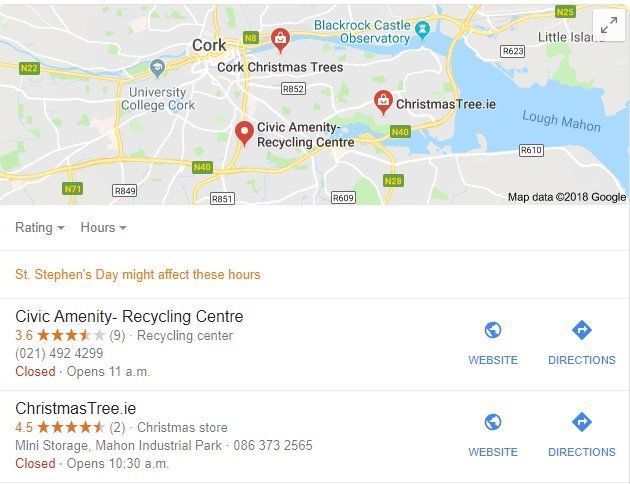Can you recycle Christmas decorations and wrapping paper?
The presents have been joyfully ripped open, the dinner has been ravaged and now to deal with the clean up after Santa's visit! So what can and can't you recycle to do your bit for Ireland's oceans? We have compiled a list of tips of how you can best dispose of christmas trees, decorations and christmas wrapping paper!
Most people recycle during Christmas with the best intentions but are we doing it right? To help clear up what can and can't be recycled we have composed a list to guide you towards an ocean friendly Christmas!
1. WRAPPING PAPER
Depending on the composition of wrapping paper and the amount of sticky tape and embellishments that cause problems at recycling plants, some local authorities do not accept wrapping paper for recycling. So what kind of gift wrap can you recycle in Ireland? The majority of wrapping paper is composed of light card or printed paper, but shiny metallic wrapping paper is made of plastic film.
Gift -wrap made of paper and light card can go straight into the household recycling bin as long as it is clean and dry. Metallic shiny paper cannot. To tell the difference, try to tear the paper, if it does not rip and needs to be cut with a scissors then it cannot be recycled.
*Top Tip->
2. CARDBOARD
Goods ordered online this Christmas, is likely to deliver your items in boxes or envelopes made from corrugated cardboard which is widely recycled by local authorities.
*Top Tip=>Always remember to remove any plastic or polystyrene inserts and excess sticky tape from cardboard boxes before recycling.
3. BATTERIES
Did batteries run out in your fairy lights or other decorations and now you are wondering of how best to dispose of them? New toys and gadgets mean more batteries to recycle. Some local authorities collect batteries bagged separately with household recycling but there are also many battery recycling points in shops around town.
*
Top Tip->
4. CHRISTMAS TREE LIGHTS
Fairy lights can be recycled at household waste recycling centres. Some local authorities collect small electricals as part of their recycling collections and may also provide collection bins at other sites too, e.g. at supermarkets.
*Top Tip->5.CHRISTMAS DECORATIONS
If your tinsel and glass or plastic baubles have broken then they need to be disposed of carefully in the general waste. Other items such as lights and wreaths can be recycled.
*Top Tip->
Natural parts of Christmas decorations, such as ivy and holly, can be recycled with green or garden waste, once artificial elements such as bows and glitter have been removed.
6. CHRISTMAS CARDS
Most cards are paper based and can be recycled, along with their envelopes, either in your home recycling collection, at local recycling points such as household waste recycling centres or at banks in supermarket car parks etc.
*Top Tip->7. CHRISTMAS TREES
'Real' Christmas trees can be recycled and turned into chippings. Some local authorities have special collections or organise drop-off points. Otherwise they can be taken to your household waste recycling centre.
*Top Tip->8. CHRISTMAS DINNER
*Top Tip->
Source your Christmas fruit and vegetables loose, not pre-packed. This helps reduces the amount of packaging. Also you can take unused or unwanted food to foodbanks after Christmas.
9. OLD TOYS
Toys with computer chips,
computer screens, lights,
noise, plugs, batteries or
other electronic
components can and
should be recycled. They
should not be added to
the domestic waste.
*Top Tip->
Recycle IT offer a
collection and drop off
services and will accept
electrical and electronic
toys including games
consoles, cameras, tablets,
remote control cars or
planes, dolls, action
figures, watches, ect..any toy with a plug or
battery is acceptable for
recycling. You can also donate old toys to charities such as "Simon Community" or "St. Vincent de Paul".
10. RECYCLING IS NOT JUST FOR CHRISTMAS
Recycling should be done all year round, with the rate of plastics being produced and consumed scientists have predicted that there will be more plastic in the oceans than fish by 2020, recycling may not be enough but it is the minimum standard that should be achieved if we want a healthy planet for future generations.
*Top Tip->
Reduce your consumption of plastics for 2019, buy a stainless steel flask and cut down on using plastic bottles, bring a reusable bag shopping and try to buy food and products with minimal packaging.
SHARE THIS ARTICLE















